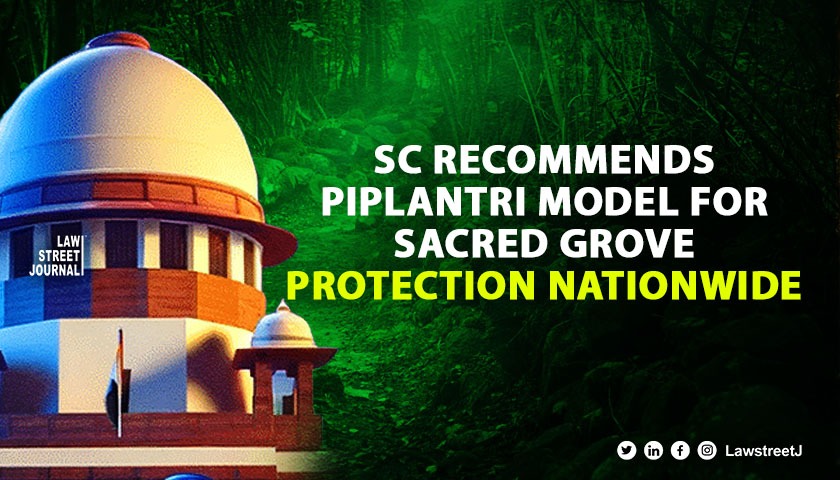NEW DELHI: The Supreme Court has said the "Piplantri" model, created in a small village in Rajasthan’s Rajsamand district, should be replicated across the country for protection of sacred groves by involving the community people.
SC Urges Nationwide Adoption of Rajasthan’s Piplantri Model for Forest Conservation
A bench led by Justice B R Gavai recommended the Union government's Ministry of Environment, Forest and Climate Change (MoEFCC) to create a comprehensive policy for the governance and management of sacred groves across the country and create policies and programs protecting the rights of the communities and involve them in forest conservation.
Maintaining that India is home to thousands of community-protected forests known as ‘sacred groves’, the bench, also comprising Justices S V N Bhatti and Sandeep Mehta, said as part of this policy, the MoEFCC must also develop a plan for a nationwide survey of sacred groves, by whatever name they are identified in each state.
Supreme Court Recommends Community-Driven Policy for Sacred Grove Protection
The court said this survey should identify their area, location, and extent, and clearly mark their boundaries. These boundaries should remain flexible to accommodate the natural growth and expansion of these forests while ensuring strict protection against any reduction in size due to agricultural activities, human habitation, deforestation, or other causes.
The court noted sacred groves are known by diverse names across different regions: Devban in Himachal Pradesh, Devarakadu in Karnataka, Kavu in Kerala, Sarna in Madhya Pradesh, Oran in Rajasthan, Devrai in Maharashtra, Umanglai in Manipur, Law Kyntang/Law Lyngdoh in Meghalaya, Devan/Deobhumi in Uttarakhand, Gramthan in West Bengal, and Pavithravana in Andhra Pradesh.
The bench said models like Piplantri village of Rajasthan, which demonstrated how community-driven initiatives can effectively address social, economic, and environmental challenges in a cohesive manner, are required to be implemented and replicated across the country.
In its judgment, the bench said active measures are required at the governmental level to ensure that ideas like Piplantri village are implemented and replicated in other parts of the country to promote sustainable development and gender equality.
"The central and state governments should support these models by providing financial assistance, creating enabling policies, and offering technical guidance to communities," the bench said.
Inspired by community-driven conservation efforts, the "Piplantri" model, created in a small village in Rajasthan’s Rajsamand district, showed how environmental protection, gender equality, and economic growth can work together to change communities.
It started after the tragic death of a girl child of Shyam Sundar Paliwal, the Sarpanch of the village, which had suffered from environmental damage due to excessive marble mining, leading to water shortages, deforestation, and economic decline. To counter this, the community led by its visionary Sarpanch Shyam Sundar Paliwal introduced a practice of planting 111 trees for every girl born. This initiative transformed the damaged environment not only of the village but also of the nearby areas. This phenomenal effort also gave positive impetus to the efforts for reducing societal biases against women.
The court said, "The Piplantri model has had many positive effects. Environmentally, over 40 lakh trees have been planted, which has helped raise the water table by 800-900 feet and cooled the climate by 3-4°C."
These efforts have improved local biodiversity and protected the land from soil erosion and desertification. Economically, the planting of indigenous species of trees like gooseberry, aloe vera, and bamboo has created sustainable jobs. Aloe vera processing, furniture making, and other businesses have increased local incomes, providing work, especially for women, through self-help groups. Socially, the model has helped eliminate harmful practices like female foeticide.
The village now has a rare distinction of a higher female population ratio i.e. 52% and ensures that all girls receive education. Financial support through the "Kiran Nidhi Yojna" has empowered girls and their families, creating a community that celebrates and rejoices on the birth of a girl child rather than resenting it.
Referring to the National Forest Policy, 1988, which carries a statutory flavour, the bench pointed out it highlighted the importance of encouraging people with customary rights in forests to help protect and improve forest ecosystems, as they depend on these forests for their needs.
"Therefore, it is suggested that MoEFCC should strive to create policies and programs that protect the rights of these communities and involve them in forest conservation," the bench said.
Senior advocate K Parameshwar, acting as amicus curiae, submitted sacred groves in different States are managed in various ways. Some are overseen by village panchayats or local bodies created for this purpose, while others rely solely on community traditions without any formal governance.
Dealing with an application filed by Aman Singh for protection of 'Orans', 'Dev-vans' and 'Rundhs', the directed to grant those a legal status of 'forest' under the Forest (Conservation) Act, in view of their ecological, cultural, and spiritual significance.
The court directed the forest department of the state to carry out detailed on-ground mapping and satellite mapping of each sacred grove, such as Orans, Dev-vans, Rundhs, or by any other name by which they are known in the respective area and to complete the survey and notification of sacred groves/Orans in all districts.
"Given the ecological and cultural importance of sacred groves, it is recommended that they be granted protection under the Wildlife Protection Act, 1972, specifically through Section 36-C, which allows for the declaration of 'community reserves'," the bench said.
It directed the MoEFCC in collaboration with the state government's forest department, to constitute a five-member committee with domain experts, preferably headed by a retired Judge of the Rajasthan High Court, to ensure compliance of its directions.















